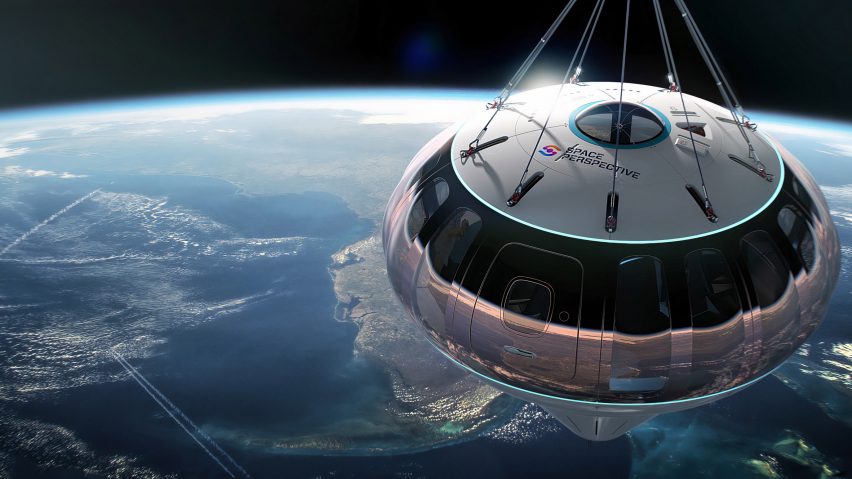
"Every self-respecting spaceship should have a bar" says CEO of space tourism company
Taking tourists on day trips to look down on Earth will lead to people "connecting deeply with our planet", says Space Perspective co-founder Jane Poynter in this exclusive interview.
Tourism firm Space Perspective is promising to offer comfortable, environmentally conscious trips to the brink of the atmosphere by the end of 2024.
Co-founder, CEO and chief experience officer Poynter claims its approach "will have a huge positive impact on our society".

Space Perspective is one of numerous enterprises racing to make the sci-fi notion of space tourism a reality, alongside Elon Musk's SpaceX, Jeff Bezos' Blue Origin and Richard Branson's Virgin Galactic – although the Florida-based company is doing things differently.
Unlike traditional space vehicles which use rocket power to blast their way into the sky, Space Perspective plans to lift tourists gently through the atmosphere in ships tethered to hydrogen balloons.
The ride will be so gentle that passengers will be able to enjoy drinks at the bar, though alcohol servings will be limited due to mass constraints.
"Our core mission is to take people to space to have this mind-blowing experience of seeing Earth in space and connecting deeply with our planet, and then, hopefully, some of them coming back and doing something amazing with that energy," explained the 59 year-old when she sat down with Dezeen in central London.
"And so now if you can image tens of thousands, hundreds of thousands, and eventually millions of people, having that experience, it will completely change how humanity thinks about itself."
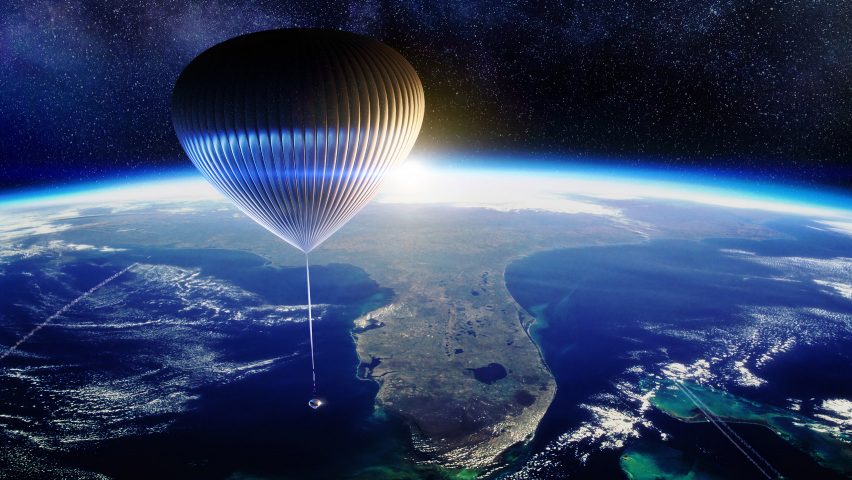
An Amercanised Brit, Poynter co-founded Space Perspective with her husband in 2019 after a career in space tech stretching back to the early 1990s.
The company's Spaceship Neptune vessel is made up of a small, pressurised capsule with capacity for eight passengers plus a pilot, connected by a tendrilous "reserve descent system" (a pre-deployed parachute) to a gigantic hydrogen-filled balloon. In total, the vehicle is around 210 metres tall.
Using the buoyancy of the hydrogen, the spaceship will off from the ground at dawn and ascend 30 kilometres to beyond 99 per cent of the atmosphere – high enough, in Poynter's words, that "you get that complete blackness of sky, where you really see the curvature of the Earth".
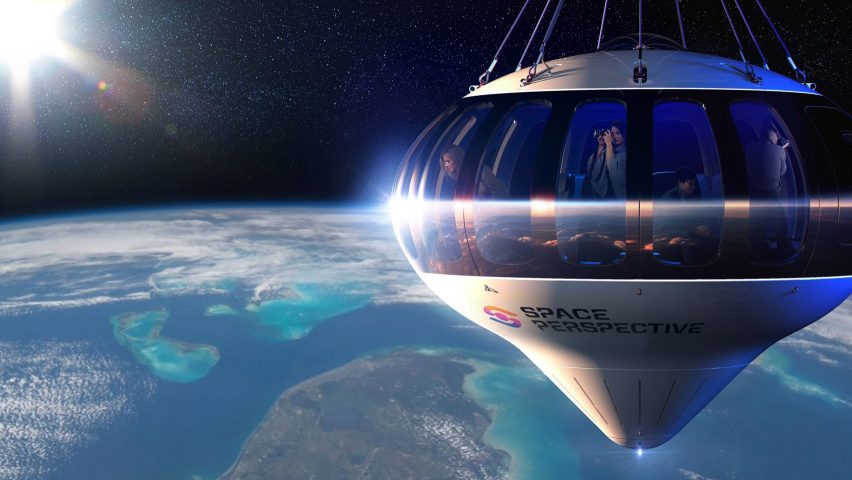
This method is "essentially zero-emission" she adds. Space Perspective says it will take the hydrogen from renewable sources and is still in the process of selecting a supplier. At the end of a flight, the capsule will be reused while the balloon will be recycled.
It also purchases carbon offsets against the rest of its operations, having previously used offsetting provider The Good Traveler.
"You get into a capsule that's incredibly comfortable," Poynter said. "And the design of it is such that as you lift off from the ground, it's completely smooth. So the seats that you're sitting in are super comfy and afford you this insane view of the planet."
The whole thing takes six hours; two to go up, two spent looking down on the rest of humankind and two to come back down again.
"We've really reimagined spaceflight completely"
All essential amenities will be provided in the capsule, including a loo and, of course, a bar, where the pilot will be mixing the drinks.
"We like to joke that every self-respecting spaceship should have a bar," quipped Poynter. "And we talk about that because you really can't do that on a rocket-based flight. It just is emblematic of how gentle it is that you can actually have a bar where people will be able to stand at and have a drink, and cheers."
It will be, she adds, "a real bar", not just "a little shelf", while food will also be served on the flight. There will, however, be a limit to how much alcohol the vessel can carry.
Other details have also been designed into the Neptune to correspond with this "human-centric" approach.
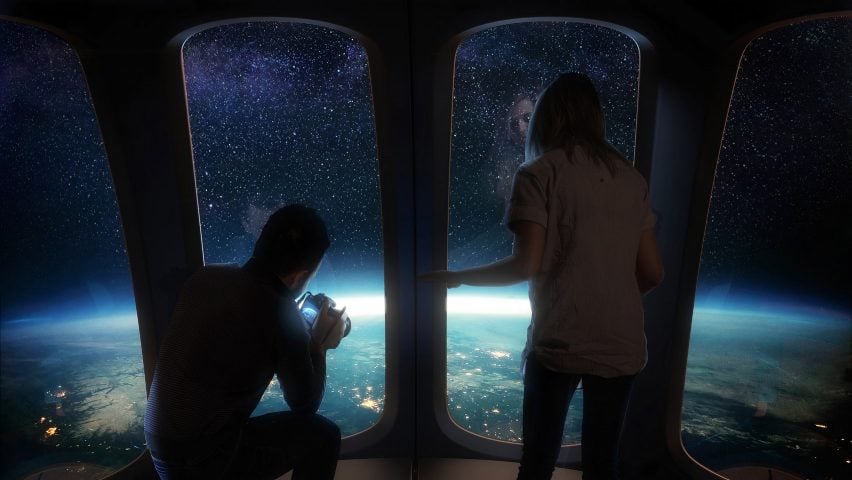
The windows are very tall and wide, with only vertical divides between them so as not to minimise the impact on the view. The bottom of the capsule is cone-shaped to attenuate splashdown, for the gentlest landing possible.
"When you think about space travel you think of discomfort; of uncomfortable camping," said Poynter. "So we put the human experience at the centre of it. You know, when you think about it, we've really reimagined spaceflight completely."
Space Perspective is now beginning to work with an interior designer ahead of its first crewed test flight, scheduled for 2023. The first commercial flight is slated for 2024, with tickets set at £115,000 each.
In the long-term, the aim is to bring that price down closer to £40,000. Part of this will involve increasing capacity, both in terms of the capsule size and number of flights, with the company planning to branch out from Florida to new locations, including in Europe.
Space Perspective says it is eager to work with scientists and artists to make the most of its trips out to the cosmos, by designing research-gathering instruments to fit onto the vehicle, for example.
For its Neptune One uncrewed test flight in June 2021, the company collaborated with art collective Beyond Earth to produce Living Light, transforming the huge balloon into a giant installation.
Space Perspective founded in Biosphere Two
Poynter is clearly personally infatuated with the heady notion of space travel. As a child growing up on the Isle of Wight off the English coast, she was fascinated by Star Trek and the writings of Isaac Asimov.
For decades, she says, she has been convinced that humans are "a multiplanetary species".
Her career in space properly began in 1991, when she was one of eight people selected to enter Biosphere Two, the world's first attempt at an entirely man-made environment – the first biosphere being Earth itself.
This sealed three-acre glass-and-steel science Big Brother house in the Arizonan mountains was essentially a prototype space base, with inhabitants instructed to recycle their air and water and grow their food.
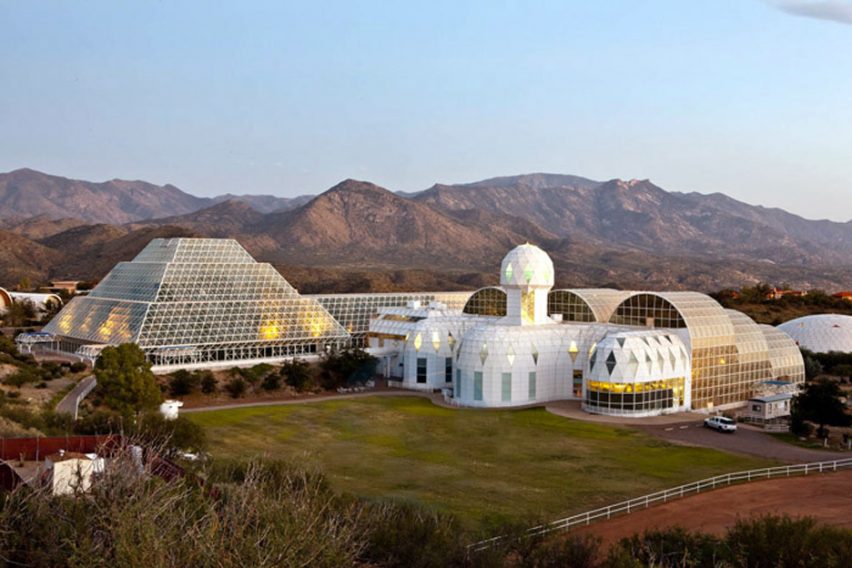
It was later the basis for Bio-Dome, a 1996 stoner comedy despised by critics, and was the subject of the 2020 documentary Spaceship Earth.
The experiment was scientifically controversial and mired in difficulties, but for Poynter personally, it bore significant fruit.
While inside the sphere, she co-founded a company called Paragon Space Development Corporation with a fellow inhabitant Taber MacCallum, who is now her husband and co-founder and co-CEO of Space Perspective.
And she traces the company's philosophy back to her experience in Biosphere Two.
"I knew moment-to-moment that the plants around me were providing me with my oxygen, that I would breathe out the CO2 that would grow the food," she explained.
"We were completely interdependent. So it gave me this profound connection to this life system, which is extensible to Planet Earth – we all live in this planetary biosphere," she continued.
"Well, it turns out that when astronauts see Earth from space, they have this tremendous connection with Planet Earth, and with the singular human family that inhabit it."
This phenomenon is where the company gets its name – Space Perspective.
Poynter dismisses the suggestion that there may be rather different societal implications between astronauts going to space and those wealthy enough to spend a six-figure sum on a day trip.
"I completely disagree 150 per cent," she shot back instantly. "Like, 1,000 per cent. Because I've seen what happens when people go."
"It's about humanity going further than Earth"
Space travel, particularly when fronted by billionaires, remains a controversial topic. A recent survey by reputation management consultancy Transmission Private found that more than three-quarters of the UK public believe the wealthy should instead "focus their resources on problems facing Earth, like climate change".
Space Perspective positions itself very differently to the macho world of unfathomably rich men with a penchant for tight shirts penetrating the atmosphere in phallus-shaped vessels.
But Poynter is not critical of Musk, Bezos and Branson.
"We're all pushing hard to get up out of the gravity well and go further and farther, so I feel, yeah, they're billionaires, yes they choose to spend their money in this way, but for me it's about humanity going further than Earth," she said.
"We're at the very beginning of this industry. When airplanes were first flown we had a very limited view of what they were going to be used for. They were for wealthy people to fly across the country.
"I think the same is true with space flight. We cannot imagine now how human space flight is going be used in the future, how business is going to use it, and how it is going to impact society, our lives, into the future."
Images are courtesy of Space Perspective unless otherwise stated.